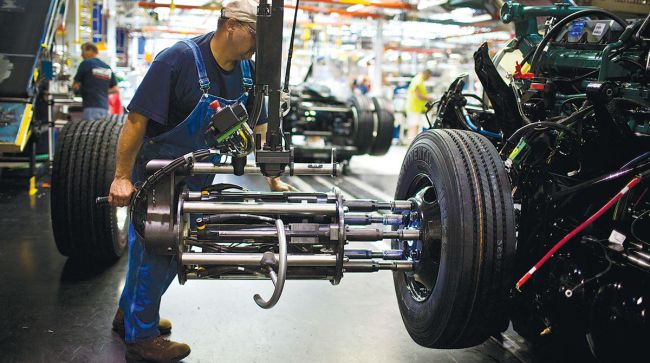Production at U.S. factories barely rose in August as a drop in motor vehicle assemblies masked a rebound in output of other consumer goods and business equipment.
The 0.1% increase in factory output followed a revised 0.4% gain a month earlier, according to Federal Reserve data published Sept. 14. Excluding auto production, manufacturing output increased 0.6%, the largest gain since the start of the year.
Total industrial production, which also includes mining and utilities, rose 0.4%. The median forecast in a Bloomberg survey of economists called for 0.1% increases in both factory output and total industrial production.
Output of business equipment rose a solid 0.8% after a 0.9% gain in the previous month, while production picked up for home electronics and appliances and furniture.
Aug. #IndustrialProduction: Total +0.4%, Mfg. +0.1%, Motor vehicles & parts -5.0%, Mfg. ex. motor vehicles & parts +0.6%, Mining +1.4%; #CapacityUtilization 79.7% https://t.co/nYuGKYaV9g#FedData
— Federal Reserve (@federalreserve) September 15, 2023
That’s welcome news for manufacturers that have struggled much of the year as retailers limited orders to get inventories more in line with sales. Higher borrowing costs and uncertainty about the demand outlook have also contributed to a slowdown in capital goods orders in recent months.
Recent data shows retailers have made progress in recent months getting inventories more in line with demand. The inventory-to-sales ratio for retailers excluding motor vehicle dealers fell in July to the lowest level since November.
And while recent surveys of purchasing managers suggest the contraction of activity in the sector is ongoing, the pace of decline has begun to moderate. Separate data Sept. 14 showed manufacturing in New York unexpectedly expanded in September, and forward-looking measures indicated greater optimism about business conditions in the next six months.
Meanwhile, production of defense-related goods continued to soar. The Fed’s index of military and space equipment increased another 3.5% in August, the largest gain since May 2020, to a fresh record.
The Fed’s report showed capacity utilization at factories, a measure of potential output being used, was unchanged at 77.9%. Overall utilization rose to a four-month high of 79.7%.
Utility output increased 0.9%. Mining production jumped 1.4%, the largest advance since January and primarily due to higher oil and gas extraction.






